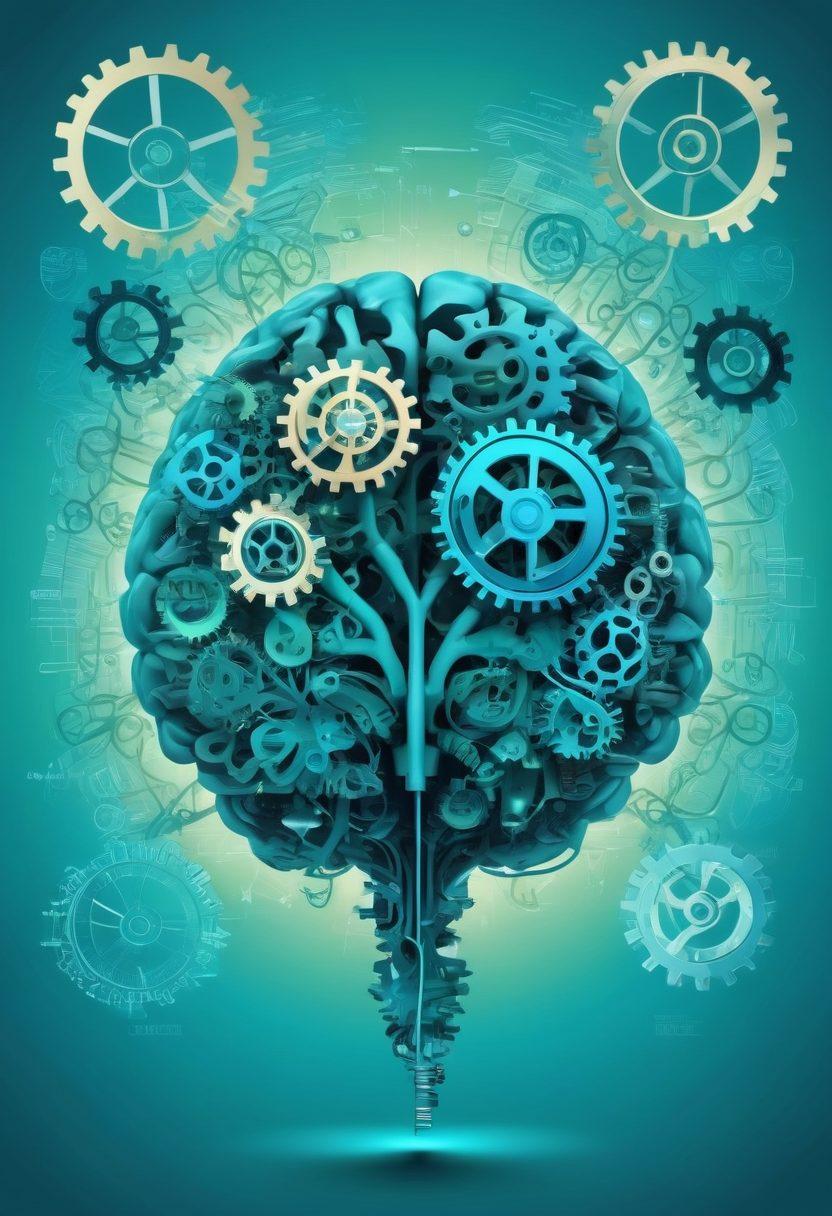Unlocking Your Mind: 10 Proven Strategies for Enhanced Emotional Wellbeing and Personal Growth
In an age where the hustle and bustle of daily life often clouds our ability to connect with ourselves, the concept of emotional intelligence emerges like a guiding light. Have you ever wondered why some people seem to thrive in social situations or navigate their emotions with ease? Emotional intelligence, the ability to recognize and manage our own emotions while also understanding the feelings of others, holds the key to lasting change in our lives. This blog delves into the secrets of emotional intelligence, framing it as an essential tool for personal development and mental wellness. As we uncover these psychological insights, the possibilities for enhanced emotional wellbeing and personal growth unfold magnificently before us.
Imagine this: you wake up in the morning, feeling a surge of energy and clarity. You approach your day armed with mindfulness and a strong sense of emotional intelligence. It’s possible! By honing your emotional awareness and understanding human behavior, you can transform your mindset, paving the way for profound changes in your life. Behavioral science suggests that developing emotional intelligence can lead to improved stress management skills, more fulfilling relationships, and a deeper connection to your own self-worth. Remember, emotional wellbeing isn’t just a destination; it’s a journey that involves actively engaging in therapeutic practices and self-help methods.
As you embark on this journey, it’s crucial to ask yourself: How well do I truly know my emotions? Self-reflection is a vital aspect of emotional intelligence. By taking the time to explore your cognitive processes through meditation or journaling, you can identify patterns in your thoughts and feelings that may be holding you back from personal growth. Consider the power of psychoanalysis or psychotherapy – both can serve as transformational practices that unveil the underlying reasons behind your emotional responses. When we bravely confront our inner workings, we can replace self-doubt with self-acceptance and compassion.
Have you ever found yourself in a situation where someone’s reaction took you by surprise? Understanding emotional triggers, both in yourself and others, is a fundamental component of emotional intelligence. By mastering this skill, you can navigate through conflicts with grace and empathy. Life coaching can also encourage personal development by equipping you with tools to enhance your emotional intelligence further. Think of it as having a trusted companion who guides you in developing strategies for better communication and relationship-building. The growth you achieve through this process will ripple out into every aspect of your life.
Finally, let’s embrace the principles of positive psychology. Cultivating an emotional mindset is not just about overcoming challenges, but also about celebrating victories. Acknowledge and reward yourself for the small steps you take towards emotional intelligence. Nurturing your mental fitness will create a robust foundation for healthy emotional wellbeing. With commitment, determination, and a sprinkle of curiosity about the human experience, you can unlock the secrets of emotional intelligence and unleash a wave of positive change in your life. So take a deep breath, embrace every emotion, and start this exciting journey towards a more fulfilled you.
Master Mindfulness Techniques to Transform Your Life
In our fast-paced world, where every moment seems to fly by, the importance of mindfulness has never been more pertinent. Imagine this: You're sitting in a crowded coffee shop, your mind racing with thoughts about the day ahead. Suddenly, you pause and take a deep breath, noticing the aroma of freshly brewed coffee and the laughter of friends around you. This is the essence of mindfulness – a moment of presence that opens the door to emotional wellbeing and personal growth. By mastering mindfulness techniques, you can not only improve your mental fitness but also embark on a transformative journey toward a richer, more fulfilling life.
So, what exactly is mindfulness? At its core, it’s the practice of being fully present in the moment, aware of your thoughts and feelings without judgment. According to psychological insights from behavioral science, cultivating this awareness can significantly enhance your emotional intelligence. By observing your thoughts as they arise, you learn to understand your cognitive processes better, enabling you to manage stress more effectively. Think of mindfulness as a kind of therapy that you can practice anywhere, from your morning commute to your evening wind-down routine.
One popular mindfulness technique is focused meditation, where you concentrate on your breath or a particular sound, gently redirecting your attention every time your thoughts wander. This practice has been shown to yield incredible benefits for mental wellness, promoting emotional stability and clarity. Life coaching experts often emphasize the importance of setting aside a few minutes each day for this simple yet powerful exercise. Wouldn’t you agree that in a world filled with distractions, a few moments of peace could make a world of difference?
Another therapeutic practice to enhance mindfulness is the art of mindful observation. This involves taking a few moments to carefully observe your surroundings or a specific object. It could be the intricate patterns of a leaf or the way the clouds drift across the sky. By training yourself to notice these details, you sharpen your focus and tap into the present moment. This method not only cultivates gratitude but also supports personal development by deepening your understanding of human behavior and the environment around you.
Finally, consider incorporating mindfulness into your daily routine through journaling or gratitude lists. These self-help strategies allow you to express your thoughts and emotions, fostering a proactive approach to emotional wellbeing. Reflect on your day, noting moments where you felt joy or encountered stress. Reflecting in this way can unveil surprising insights into your psyche, making it an integral part of your journey in psychoanalysis and psychotherapy. Ultimately, mastering mindfulness is not merely about improving your mental fitness; it’s about transforming your entire way of being. With dedication and practice, you’ll find that life becomes not just bearable but truly vibrant.
Harness the Power of Behavioral Science for Personal Development
Have you ever wondered what makes us tick? Behavioral science delves deep into the intricacies of human behavior, providing insights that can revolutionize our approach to mental wellness and personal development. Imagine utilizing psychological insights to enhance your emotional wellbeing and transform your life. With the right strategies, we can unlock our minds, rewire our cognitive processes, and embrace a journey of personal growth like never before. So, how do we harness the power of behavioral science for personal development?
One of the keys to emotional intelligence is understanding our feelings and those of others. Have you ever noticed how your mood shifts with your surroundings? Through mindfulness, we can enhance our awareness of these emotional triggers and learn to navigate them effectively. Whether it’s during a stressful work project or in the midst of a personal conflict, recognizing our emotions is a step forward in our stress management journey. Reflect for a moment: how often do you truly check in with your emotions throughout the day?
Therapeutic practices rooted in psychoanalysis and positive psychology can offer valuable tools for self-help. Consider therapy not just as a solution to problems, but as a transformative experience for improving mental fitness. Therapy enables us to explore our subconscious and confront past traumas that may be holding us back from personal growth. Engaging in psychotherapy isn't a sign of weakness, but a courageous step towards building a more resilient mindset. And if you're looking for a bit of guidance, think about seeking life coaching. Life coaches can provide personalized strategies to maximize your potential based on behavioral science principles.
Engaging with behavioral science also means being proactive about our cognitive processes. Simple practices, such as maintaining a journal, can help us reflect on our thoughts and behaviors. They allow us to identify patterns that may be detrimental to our emotional wellbeing. How many insights can you uncover about yourself through a mere act of writing? It can be both a powerful tool for self-reflection and a method for tracking your progress on your journey of personal development. Remember, understanding yourself is the first step to real change.
Ultimately, the goal of harnessing behavioral science is to create a more fulfilling and balanced life. By prioritizing our emotional wellbeing, we open the door to personal growth that extends beyond our expectations. Think about the last time you faced a challenge; did you respond with a growth mindset, or did you let fear hold you back? It's time to embrace the power of behavioral science in guiding our actions, adopting mindfulness techniques, and exploring therapeutic practices. Together, let's unlock the doors to our minds and embark on an exciting journey toward enhanced emotional wellbeing and personal development.


